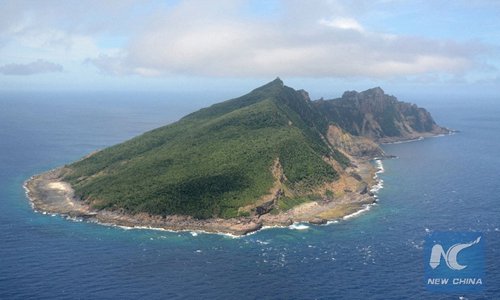
DiaoyuIslands in the E China Sea and its affiliated islands have always been China's inherent territory.
China passed its coastguard legislation on Friday, and experts said China will safeguard sovereignty regarding the dispute with Japan over the Diaoyu Islands.
The 25th session of the Standing Committee of the 13th National People's Congress (NPC) concluded on Friday afternoon in Beijing, and adopted the coastguard law. The law came one day after senior Japanese and US officials discussed their alliance and the Japan-US security treaty’s Article 5, which assures the US defense obligations apply to the Diaoyu Islands.
Japanese media said that the phone call between Jake Sullivan, national security adviser to US President Joe Biden, and Shigeru Kitamura, head of the secretariat for the Japanese government’s National Security Council, was the first high-level dialogue between the two countries since Joe Biden became president on Wednesday.
The law, according to the draft released in November by the NPC, empowers the Chinese coastguard to take action, including the use of weapons, when national sovereignty, sovereign rights or jurisdiction are being illegally infringed upon or threatened by foreign organizations or individuals at sea.
The purpose of formulating the Coastguard Law is to clarify the functions, positioning and authority of China’s coastguard, ensure a legal basis for their law enforcement cooperation, and help the coastguard better fulfill duties and obligations under international treaties, Chinese Foreign Ministry spokesperson Hua Chunying said at a press briefing Friday.
It is a normal legislative activity of China’s NPC to formulate the coastguard law, said Hua, noting China's maritime policy remains unchanged.
“The Diaoyu Islands are China's inherent territory and China upholds its territorial sovereignty and maritime rights and interests,” Hua said, urging Japan to manage differences through dialogue with China and maintain peace and stability in relevant waters.
Tian Shichen, vice president of Grandview Institution, a think tank, previously told the Global Times that international law has no specific regulation on the use of force in dealing with disputes regarding waters. "But in practice, countries are very cautious about using force.”
Lü Yaodong, a research fellow with the Institute of Japanese Studies under the Chinese Academy of Social Sciences, told the Global Times on Friday that the new coastguard law shows China's clear attitude and determination to safeguard its sovereignty.
Regular patrols near the Diaoyu Islands will be guaranteed by the legislation, according to Lü.
Observers said the dispute between China and Japan over the Diaoyu Islands could be worsened because of Japan's provocations. The law is aimed at preventing crises and managing risks.
Wang Guangtao, an associate research fellow at the Center for Japanese Studies of Fudan University, told the Global Times on Friday that Japan is eager to seek reassurance on the issue of the Diaoyu Islands from the new administration in Washington.
Japanese Prime Minister Yoshihide Suga said in late December that he hoped to visit the US for talks with Joe Biden before the end of February 2021, Japanese media said.
“Japan tries to create an impression that the US is on their side to contain China… but their tactics show Japan's dependence on the US,” Wang said, noting that the Japan is unlikely to be the priority for Biden, who is facing a domestic mess including the epidemic and political division.

